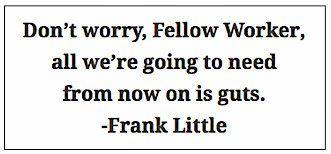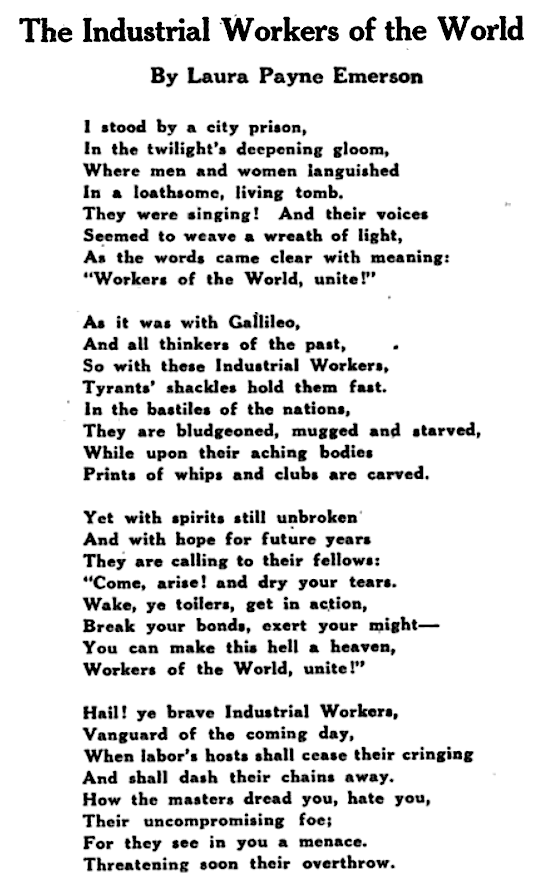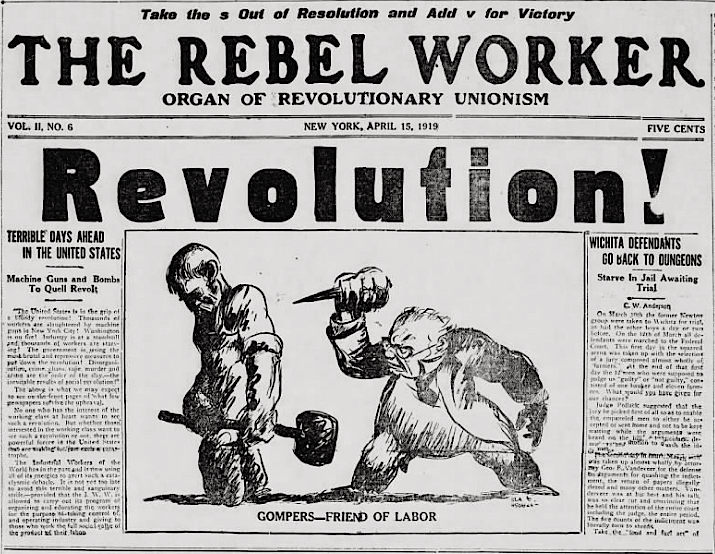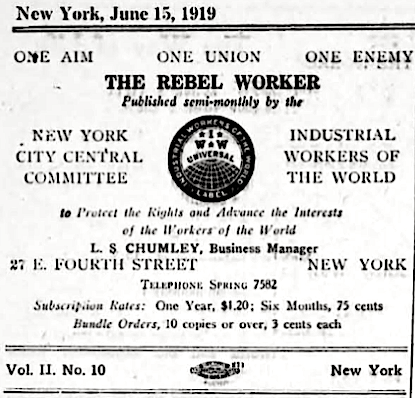 ———–
———–
Hellraisers Journal – Sunday April 20, 1919
Wichita, Kansas – I. W. W. Prisoners Appear in Court
From the New York Rebel Worker of April 15, 1919:
WICHITA DEFENDANTS GO RACK TO DUNGEONS
—–
Starve In Jail Awaiting Trial
—–C. W. Anderson
On March 10 the former Newton group were taken to Wichita for trial, as had the other boys a day or two before. On the 12th of March all defendants were marched to the Federal court. This first day in the squared arena was taken up with the selection of a jury composed almost wholly of “farmers.” At the end of that first day the 12 men who were supposed to judge us “guilty” or “not guilty,” consisted of one banker and eleven farmers. What would you have given for our chances?
Judge Pollack suggested that the jury be picked first of all so as to enable the empaneled men to either be accepted or sent home and not to be kept waiting while the arguments were heard on the bill of particulars, demurrers, and motion to quash the indictment.
The second day in court, March 13, was taken up almost wholly by Attorney George F. Vandeveer for the defense on arguments for quashing the indictment, the return of papers illegally seized, and many other matters. Vandeveer was at his best and his talk was so clear cut and convincing that he held the attention of the entire court, including the judge, the entire period. The five counts of the indictment was literally torn to shreds.
Take the “food and fuel act” of August 10, 1917, for instance. That is an “act” which provided for the punishment of those who hoarded, wasted, or otherwise hampered or interfered with the production or distribution of food, fuel, oil, natural gas, and farm products, with intent to enhance their price. This does not apply to the workers but to those who own and control.
In the oil fields there is scarcely anything else but oil and gas produced, so no one could have interfered with food, fuel, or farm products because there was none to interfere with. As far as the hampering of oil production was concerned I wish to state that the workers couldn’t have done so because statistics prove that there were 21,000,000 barrels or so more oil produced in 1917 than in 1916, in the Kansas fields alone. The powers that be have charged us with something that they got away with and profited by, and made the defendants the innocent victims of something we couldn’t have done if we wanted to. Not one profiteer has been convicted under this act that we know of.
Further, we were charged with obstructing the draft, enlistments into the Army and Navy and with insubordination in the same, in another count. In the indictment it did not specify when or how we conspired to obstruct. As a matter of fact it is a mythical charge. All defendants registered and answered their calls.
In another count we were charged with intent to murder citizens of the United States unknown to the grand jurors or anybody else, but in the indictment it does not specify when or where or whom we conspired against. That count seems to be a pipe dream cooked up by some one who thought he could get away with it under the cloak of war hysteria.
The other counts charge violation of the “S-spinach” act and other criminal codes. All are bunched together in one huge heap, making it appear as if we were a group of hardened criminals, instead of just plain industrial unionists, working for the betterment of a world through education and organization.
Vandeveer further argued that all our literature, letters, and supplies had been illegally taken, in that the search warrants did not specify what was wanted at the time of the seizures. In some instances no search warrants were presented at all. Much of the material used against us was the evidence used in the Chicago and Sacramento cases.
What is more, the writer was the only one out of this entire group that was presented with a warrant of arrest, at the time of being apprehended, and that I was taken on a William D. Haywood warrant in Chicago. Moreover, I had never seen an oil field nor had I ever been near one until forced to come down here.
As a whole the entire indictment against us is out of order and is so rotten it stinks to the high heavens. No sane individual could have been the author of such a document. Previous to September 24, 1918, we had been held for 10 months on a smaller indictment, charging only violation of the food and fuel act but it was too rank for presentation in court, so was quashed and on waiting for decision last September were reindicted on this present five count indictment, which was even more ridiculous.
In his arguments for the quash, etc., of this indictment, Vandeveer quoted many cases and astounded the legal fraternity of this neck of the woods. He raised all his points on technical flaws and there is no way to get around them. The opposition had little or nothing to say and was completely taken by surprise. The prosecutor tried to raise the point that the I. W. W. was a criminal organization, but there is not a court of law in this country that has ever proved it as yet.
At any rate the judge was so impressed by Vandeveer’s arguments that he asked if both sides would present their briefs in printed form, allowing each side 30 days apiece to get them filed. This was with the understanding that providing the defendants were willing to lay over this period. We consented to lay over. The judge will probably render his decision on or about two months from the time we were last in court, March 13. It seems as if the object in view of the judge in having the briefs filed in printed form was for the purpose of establishing a precedent case, and if he is the jurist that they claim he is he will sustain our quash to throw the case out of court. But if he should overrule it, we go to bat next September, and if we have to lay in the jail till that time, it will mean 22 months in county jails, mostly of the worst description.
Since last September and even at the present time 28 of us are held under $10,000 bail and conditions such that they are prohibitive and next to impossible for us to make them. If there ever was an iron heel used, it has been applied to us most vigorously. Many of the defendants are physically weak, one died last fall, three are mentally unbalanced, and a few have contracted symptoms of tuberculosis.
After the court proceedings at Wichita 10 of the boys were moved to the Reno County jail, at Hutchinson, Kans., as follows: M. Sapper, corresponding secretary; Robert Poe, A. Barr, F. Patton, H. M. McCarl, J. Wallberg, Leo Stark, S. Forbes, E. M. Boyd, and J. Geffrey.
Six of us were brought here [Lawrence] for safe-keeping as follows: C. W. Anderson, corresponding secretary; F. J. Gallagher, H. Drew, S. B. Hicok, E. J. Huber, and P. J. Higgins.
Twelve were moved to the Shawnee County jail, at Topeka, Kans., as follows: O. E. Gordon. W. Franick, M. Quinn, Joe Gresbach, M. Hecht, R. A. Lambert, Tom o’Day, P. Maihak, E. Henning. F. Grau, George Wengerand, C. Schnell.
The conditions in Topeka are intolerable. It is a virtual Middle Age dungeon and as had as that one at Wichita. How long is humanity to suffer in such vile dens? The Topeka can is not fit for human habitation.
Here in Lawrence we have a clean jail and the food is much better than in some jails but we are fed only twice a day, 7.30 a. m. and 2 p. m., whereas at Newton and Hutchinson prisoners are fed three times a day. We are in a small steel tank, with very little room for exercise. And plenty of exercise and fresh air is what we need now, on account of our 16 months’ confinement.
———-
[Emphasis and photograph of Rebel Worker added.]
~~~~~~~~~~~~~~~~~~~~~~
SOURCES
Quote Frank Little re Guts, Wobbly by RC p208, Chg July 1917
Wobbly:
The Rough-and-tumble Story of an American Radical
-by Ralph Chaplin
University of Chicago Press, Jan 1, 1948
Chapter 18-War, pages 208-9
https://books.google.com/books?id=n-ygPQAACAAJ
The Rebel Worker
“Organ of Revolutionary Unionism”
“Take the s Out of Resolution and Add v for Victory”
(New York, New York)
-Apr 15, 1919
https://play.google.com/books/reader?id=fuMtAAAAMAAJ&printsec=frontcover&pg=GBS.PA653
From:
Attorney General A. Mitchell Palmer on Charges Made Against Department of Justice by Louis F. Post and Others, Volumes 1-2
-Hearings before Committee on Rules, House of Representatives
-June 1920, Sixty-Sixth Congress
United States. Congress. House. Committee on Rules
U.S. Government Printing Office, 1920
https://books.google.com/books?id=fuMtAAAAMAAJ
Exhibit No. 32: The Rebel Worker of Apr 15, 1919
https://play.google.com/books/reader?id=fuMtAAAAMAAJ&printsec=frontcover&pg=GBS.PA653
IMAGE
Rebel Worker of Apr 15, from NY Tb p88, May 25, 1919
https://chroniclingamerica.loc.gov/lccn/sn83030214/1919-05-25/ed-1/seq-88/
See also:
For full edition of Rebel Worker, see:
The Rebel Worker
(New York, New York)
-June 15, 1919
Business Manager: LS Chumley, 27 E Fourth St NY
https://www.sos.wa.gov/legacy/publicationsviewer/?title=Rebel%20Worker&page=1&id=272
Hellraisers Journal – Friday March 28, 1919
New York, New York – Defense Committee Statement on Persecution of IWW
Tag: Wichita IWW Class War Prisoners
https://weneverforget.org/tag/wichita-iww-class-war-prisoners/
WE NEVER FORGET: FW James Gossard
Who Died October 30, 1918, Awaiting Trial in Harvey County Jail, Newton, Kansas
~~~~~~~~~~~~~~~~~~~~~~~~~~~~~~~~~~~~~~~~~~~~~
The Industrial Workers of the World –
Lyrics by Laura Payne Emerson
-from Industrial Pioneer of March 1921
https://play.google.com/books/reader?id=sY9ZAAAAYAAJ&printsec=frontcover&pg=GBS.RA1-PA12

Performed by Twin Cities Labor Chorus


